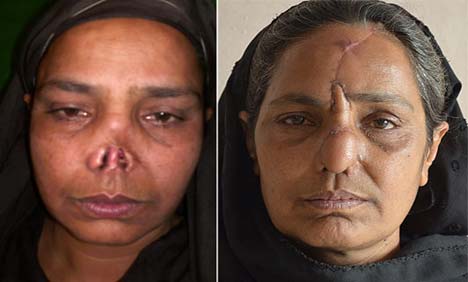While watching the BBC news a while back I became really angry. BBC reporter Orla Guerin was interviewing Pakistani woman Allah Rakhi whose husband had cut off her nose 32 years ago. Orla was now reporting on the reconstructive surgery that had just given Allah a ‘new’ nose and given her a new life. But then she interviewed the husband! He showed no remorse at all and even had the gall to blame her, his wife for the injuries he had inflicted on her. He felt justified in what he had done. My anger reached a new level.
The story of Allah Rakhi
After six years of abuse, Allah Rakhi decided to walk out of her marriage. Her husband caught her in a field as she was trying to escape. ‘He told me to sit down and listen to him,’ Allah said. ‘I told him he had destroyed my life, beating me every day and that I was going to my parents’ house. He sat on my chest, and reached into his pocket for a blade. As he slashed my nose off, blood poured into my eyes. Then he cut my ankle, from one side to the other.’
Her foot was slashed for leaving the house without his permission. Allah had been the family beauty but her husband destroyed that.
The Human Rights Commission of Pakistan reported that in 2011, at least 943 women were murdered, nine had their noses cut off, 98 were tortured, 47 set on fire and 38 attacked with acid. Women can be targeted on suspicion of having an affair, wanting a divorce or dressing ‘inappropriately’. Hundreds of women are murdered each year because of mere suspicions.
Blaming the victim
But what got to me was the sheer arrogance of the way the husband blamed his wife for his abuse – ‘It was all her fault’.
Have you ever wondered why people blame the victim for the negative things that happen to them? It seems to be all too common.
- As a child you may remember complaining to you mother about someone at school picking on you or being plain nasty to you? All too commonly a parent’s reply is something like this. ‘What did you do to start it in the first place? The child is blamed for someone else’s nastiness. It’s called ‘blaming the victim’ and is very hurtful. Actually in psychological terms it’s called secondary abuse.
- A woman gets raped and what sort of comments do you hear? ‘Well, dressed like that she was asking for it’ or ‘What did she expect going to that part of town? … and so it continues. More secondary abuse is meted out to the victim. It’s the perpetrator of the abuse who deserves the blame, not the victim.
- And I’m sure you’ve heard well meaning people remark that a person didn’t deserve the bad things that happened to them. This again implies that only bad people deserve bad things to happen to them.
Why people blame the victim
People have this false idea that the world is just and is governed by a rule that says ‘good things happen to good people and bad things happen to bad people’. A logical consequence to this is the belief that if something bad happens to you, it must be your fault, you’ve done something wrong because ‘bad things’ don’t happen to good people.
Everyday we learn of people who suffer without any apparent cause. But it’s more comfortable to believe in a just world in which actions have predictable, appropriate consequences.
When we witness injustice we have two choices. The first correct response is to be outraged. The second response is to blame the victim. In this way we can maintain the faulty belief that bad things only happen to bad people. Now we no longer feel outraged.
Being outraged at injustice necessitates action. That is how social action groups form. The Acid Survivors Foundation in Pakistan is one such group formed to help those women in Pakistan who have been maimed by having acid thrown in their faces. There are many such groups in the world, seeking to deal with injustice. I can’t help but think of the outrage felt by William Wilburforce towards slavery, and how his outrage eventually led to the abolition of slavery.
What can you do?
- Accept that bad things happen to good people. There is no such world law that says you have to be a bad person for bad things to happen to you.
- Be vigilant about not falling into the trap of blaming the victim. If your spouse or children or colleagues complain about feeling hurt, DO NOT ask them what they did to cause the other person’s reaction. Rather listen to their pain and empathize with them. Don’t inflict secondary abuse by blaming the victim for their pain.
- Remember that no matter what the circumstances might be, nobody has an excuse to physically or emotionally abuse another person.
- If you have been unfairly victimized, you can seek help from others who have been in a similar situation. See if there are any support groups where you can be helped, or action groups where you can tunnel your outrage and energy.
